

It was an important start of this year’s DARWIN’S CIRCLE conference at 30th of March 2022 at Palais Ferstel in Vienna. Numerous national and international guests were able to participate in this spectacular event and attend the exciting panels and discussions. A post-report of Austrian Roadmap 2050 which was able to attend this event on site.
DARWIN’S CIRCLE as a think tank enables personal development, provides inspiration and focuses on the strengths of individuals and organizations. Our conferences serve as the networking platform to connect decision-makers and our academy is the learning hub for future skills.
Contemporary themes on the pulse of time initiated by Niko Pelinka
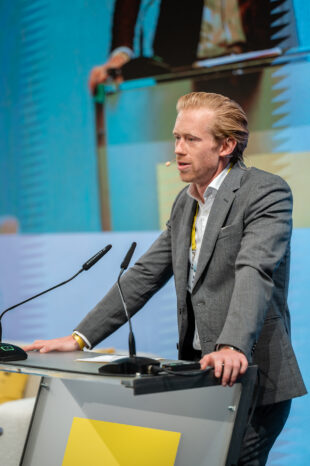
Niko Pelinka
© Klaus Ranger & Zsolt Marton
The opening words were given by organizer Niko Pelinka: „I am very happy to be able to facilitate this event today with all the international personalities who came especially for this event. A few weeks ago we were going to focus only on the sustainable issues, but since we all know about the terrible events of the Ukraine war of the last weeks, we decided to include also the economic situation of Europe in the future.“
Finance minister Magnus Brunner emphasized the importance of the topics of Darwin’s Circle
The overarching themes of the day’s panels included the economic challenge of digitalization and how to integrate the challenge of sustainability into business images for the long term.
Austrian Minister of Finance Magnus Brunner pointed to the issues of today with some opening remarks, emphasizing the importance of them: „We are setting the course of tomorrow, for the people and the environment: this is a central point of the politics finding solutions for our problems of time; the whole society, economy and policy have to face the problems of digitalization and environment.“
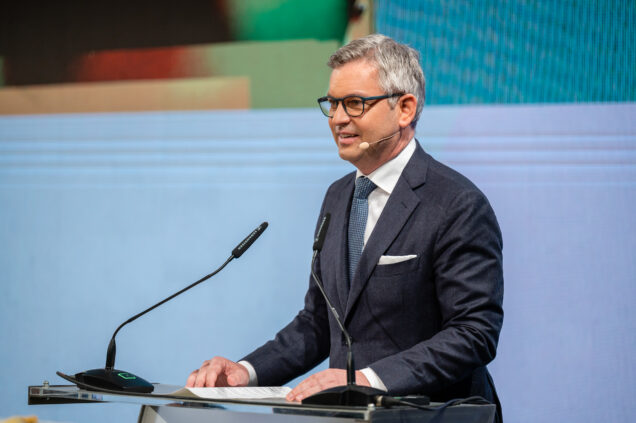
Austrian Minister of Finance Magnus Brunner. © Klaus Ranger & Zsolt Marton
Creating a crisis-resistant economy
Panel 1 discussed the topic of the future of the global digital economy. „We have become so dependent on China and Russia in recent years that we need to refocus on our own markets. We need to focus on the people inside the system and not on people like oligarchs who are already outside the Russian system, because that is the way we can actually change things,“ said Benedikt Franke (Munich Security Conference). Breaking the dependency must be a top priority now, and even if it cannot be solved in the next few days, a strategy for the coming years is absolutely necessary. Katrin Suder (Former State Secretary in the German Ministry of Defense) summed up this point perfectly: „We should take a step back and face the global problems, we need to prepare and open up new markets, because it is clear that China wants to enter the key markets (high-tech markets, robotics, automotive, etc.). We could actually have a positive outcome of the crisis if we finally face the military situation in Europe and get on track with the digital markets.
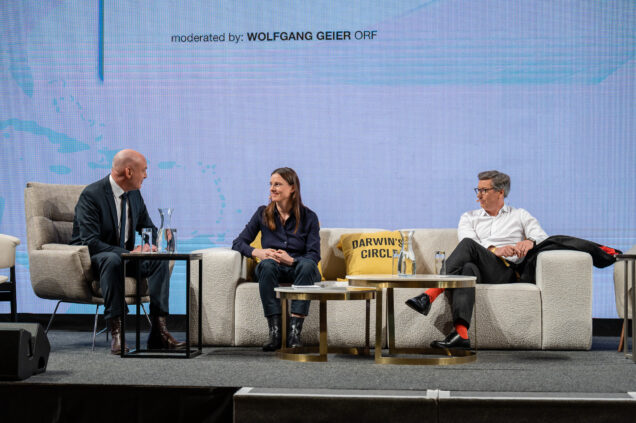
From left to right: Wolfgang Geier (ORF), Katrin Suder (Former State Secretary in the German Ministry of Defense) and Benedikt Franke Benedikt Franke (Munich Security Conference). © Klaus Ranger & Zsolt Marton
„We have been thrown out of our comfort zone – we have to act and react“
The mission to create a crisis-resistant and at the same time sustainable economy for Europe is by no means an easy one. Steffi Czerny (DLD Media) emphasized the point of transparency, because „amazing technologies are coming our way, we have to enter a new era of transparency, privacy is over“, she explained. Michael Strugl (VERBUND) additionally made it clear that this challenge will be an expensive one, but it will still be the most sustainable solution in the long run. „The challenge is not new, as we have been thrown out of our comfort zone, we have to act and react. At the end of the day, we need to know that clean energy costs money, we need to gain citizen acceptance and invest a lot of money to drive this transformation.“ The industry’s leading experts are also aware of employer branding to generate new talent. Magenta CEO Andreas Bierwirth explains, „Shareholder trust is even more important than in the past to drive the transformation to trust-based employer branding.“ Mark Kroese (Microsoft) agrees that „this is a new era of leadership: flexible work and lifestyle is an important part of the job in terms of recruitment.“
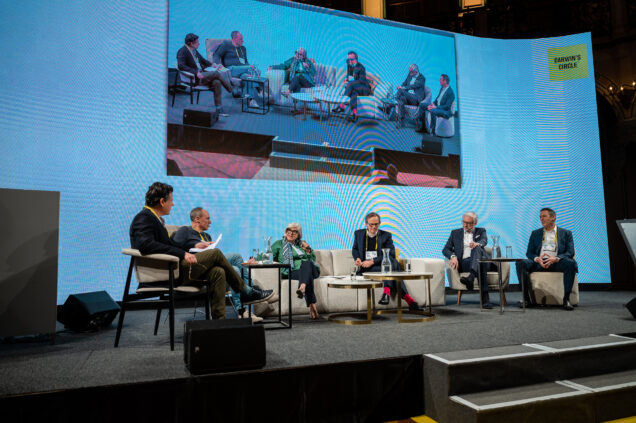
From left to right: Greg Williams ( Wired), Christoph Keese (Axel Springer hy GmbH), Steffi Czerny (DLD Media), Andreas Bierwirth (Magenta), Michael Strugl (Verbund), Mark Kroese (Microsoft) © Klaus Ranger & Zsolt Marton
Data is one of the most valuable resources of our time
Data – a valuable resource of our time. How do we use this data and which softwares can we use to avoid future conflicts or is this even possible?
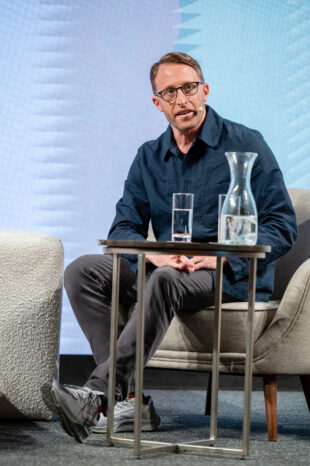
Noam Perski (Palantir) © Klaus Ranger & Zsolt Marton
Noam Perski (Palantir Technologies) clarifies the problem of the new era of wars, which includes not only military attacks but also digital attacks: „It’s a new era of wars, despite of the military scenes we see the cyber target attacks which have huge impacts on the economical situations of the countries“, and also relies as a solution on cross-European partnerships in this topic as prevention.
The expert of the Austrian Armed Forces Markus Reisner addresses clear words to the audience: „This is an information war, we are all part of it. It’s like a card game: we have the military and economical cards, and Putin is now playing the economic card and we don’t know actually what this will mean for us. We have to learn how to read the data and make good predictions to avoid situations like in Russia and Ukraine happening right now.“
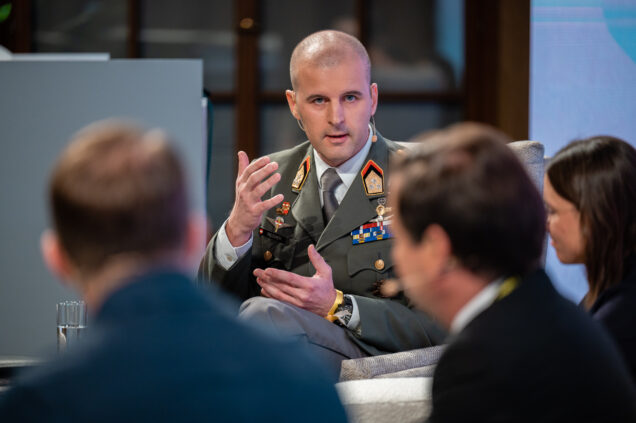
Markus Reisner (Österreichisches Bundesheer) © Klaus Ranger & Zsolt Marton
SDGs as an important driver of digital transformation
The panels continue, highlighting the challenge of the SDGs and how they can be achieved with technologies and innovations. Johann Pluy (ÖBB-Infrastruktur) sees the challenge in finding a good middle as far as the SDGs are concerned. Regarding his own company, he adds that „we need to get creative to achieve the goal of being CO2 neutral by 2040.“ Eva-Maria Ségur-Cabanac (Baker McKenzie) has a new approach: „We have to integrate sustainability as an isolated goal in every department of the company to reach the SDGs.“ CEO of Kapsch BusinessCom also sees the SDGs as an important driver for digital transformation: „We need digital transformation to achieve the green goals. Digitalization is a driver and enabler for the SDGs,“ he explains.
Open and diverse platforms for a sustainable approach
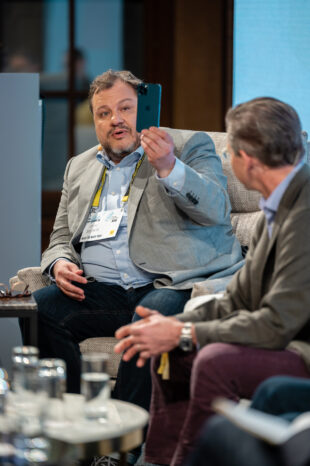
Sven Bieber (Spotify) © Klaus Ranger & Zsolt Marton
The behavior of the younger Generation Z in relation to the digital transformation is also discussed, as they represent the largest target group of this. Expert Stefan Pullach (ORF) emphasizes that the consumer behavior is clearly changing and consequently we have to adapt our online content: user centric content creation is the strategy which we use for the Generation Z to create the content we need.“ The platform Spotify has been dealing with this target group for quite some time and is convinced that „you need an open and diverse platform for a sustainable approach. We use the data especially for the younger Gerenation Z to create content which has an emotional effect,“ says Sven Bieber (Spotify).
Tools which develop and learn on their own
In the next panel 6, the experts explain from their perspective how they are transforming their company to the digital era in the long term. Philippe Sahli (Yokoy) focuses on AI, explaining that „for digital transformation, you need tools that you don’t have to replace every few years, but that evolve and learn on their own from time to time.“ And the topic of data is emphasized again, because „the future is about data: software is the key to it and therefore we should set our priorities higher on software,“ says Stefan Reuther (Copa-Data).
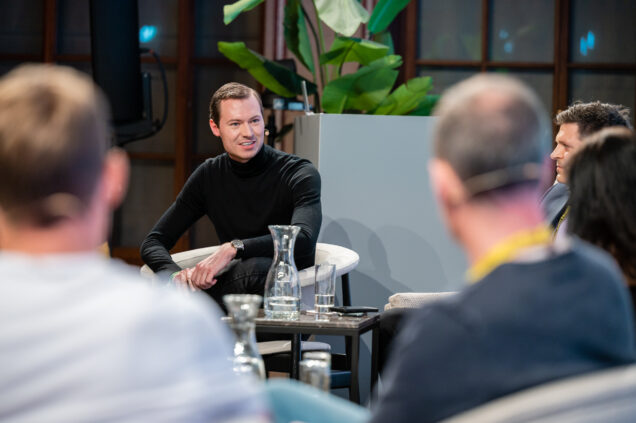
Philippe Sahli (Yokoy). © Klaus Ranger & Zsolt Marton
Creating a diverse ecosystem with a positive mindset
The final panel will discuss the social relationship between digitization and the population and what impact and positive effects it can have on us. Microsoft Austria CEO Hermann Erlach has a far-sighted view on this: „Thinking of the well-being of a company in the first place leads in the next step to productivity. Create a diverse ecosystem with a positive mindset of the employees: digital skills, sustainability, fast innovation – these key words are essential for the digital transformation.“ Sandra Bascha (New Work SE) is convinced of a corporate culture that focuses on inclusiveness and includes all employees in their opinions and concerns. „We really believe in a corporate culture which is based on transparency, participation and employee-centered. Strong teams are in my opinion always diverse.“
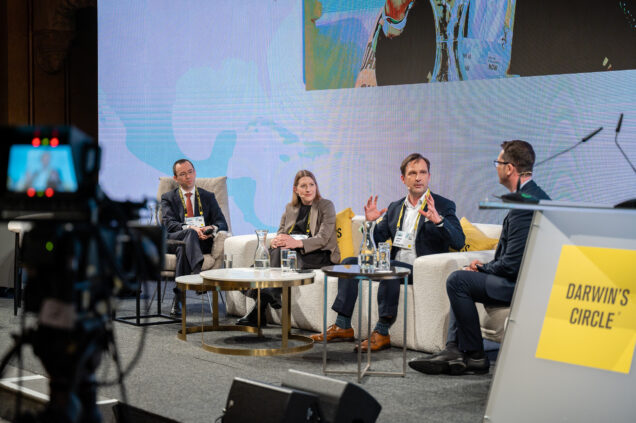
From left to right: Lukas Feiler (Vaker McKenzie), Sandra Bascha (New Work SE), Hermann Erlach (Microsoft Austria), Martin Giesswein (WU Executive Academy). © Klaus Ranger & Zsolt Marton
The day was a complete success. Experts and important decision-makers from all over the world met in Vienna to discuss the issues of the future. „I think we all go home with a good feeling,“ concluded Niko Pelinka. This exchange is an important cross-industry process in order to master these challenging issues of the future together as a society. In this way and no other way, we will launch new innovations that will bring us into a better age.
(31.März 2022, Sandra Beck)
The entire conference is available on the ORF-TVThek until Monday, April 4 2022.
Links:
Wir liefern die besten Stories und spannendsten Trends direkt in dein Postfach, jeden Freitag! Werde Teil der Community!